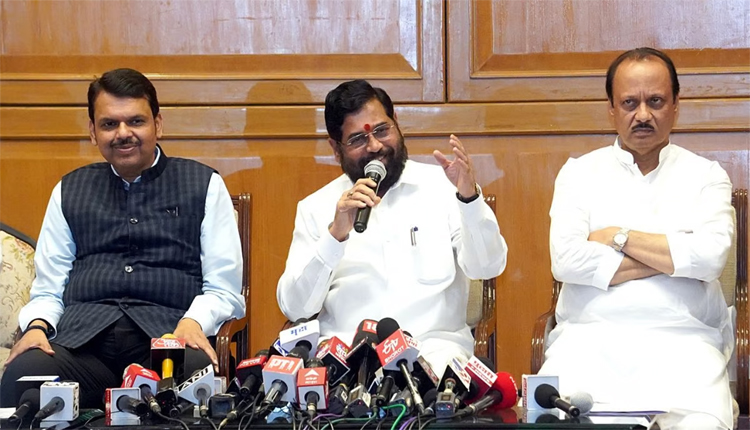Mumbai: As Maharashtra gears up for the upcoming assembly elections, the Bharatiya Janata Party (BJP) has almost finalised its seat-sharing arrangement with its key allies in the Mahayuti coalition. According to party insiders, BJP is set to contest 150 to 155 seats, while Eknath Shinde’s Shiv Sena will fight for 80 to 85 seats, and Ajit Pawar’s faction of the Nationalist Congress Party (NCP) has been allocated 55 to 60 seats. An official announcement from the alliance is expected soon.
However, the most discussed aspect of the Mahayuti’s seat-sharing arrangement is the allocation to Ajit Pawar’s party. Despite having 40 MLAs, Ajit Pawar’s NCP has been offered fewer seats than Shinde’s Shiv Sena, which has 38 MLAs. This disparity has raised questions, especially since the seat distribution formula is reportedly based on the current strength of MLAs within the alliance.
The BJP, which currently holds 105 seats in the Maharashtra assembly, is contesting the largest number of seats, with 150 slots assigned to it for the upcoming election. In comparison, in 2019, the BJP fielded candidates in 152 seats. However, the same formula has not been applied to Ajit Pawar’s party. Despite having 42 MLAs, including two from Congress, the BJP has only agreed to allocate 55 to 60 seats to Pawar’s faction.
Meanwhile, Shinde’s Shiv Sena, with 38 MLAs, has been allotted 80 to 85 seats to contest. This seat-sharing strategy between the parties is being attributed to several factors, and it sheds light on the complex political calculations within the Mahayuti.
Key Reasons Behind Ajit Pawar’s Fewer Seats
- Chief Minister Ambition: Ajit Pawar has openly expressed his desire to become the Chief Minister of Maharashtra. Just recently, on 25th September, he reiterated his ambition, stating that while he has served as Deputy CM multiple times, his goal of becoming Chief Minister has not yet materialised. His past stints as Deputy CM in the governments of Ashok Chavan, Prithviraj Chavan, Devendra Fadnavis, Eknath Shinde, and Uddhav Thackeray highlight his seniority. However, the BJP fears that if Pawar’s faction secures more seats, his push for the CM post could gain traction post-election, potentially putting the BJP in a challenging position. The BJP’s previous fallout with Shiv Sena over the CM post in 2019, which led to Uddhav Thackeray forming an alliance with Congress and Sharad Pawar’s NCP, serves as a cautionary tale for the party.
- Defection Concerns: Ajit Pawar’s political reliability has also been questioned, given his history of switching allegiances. After the 2019 elections, he briefly aligned with Devendra Fadnavis to form a government, only to retract when it came to the trust vote. He later joined Uddhav Thackeray’s government. In 2023, Ajit once again broke away from Sharad Pawar’s NCP and joined hands with the BJP. Many within the BJP remain wary of his political unpredictability, particularly as he lays claim to several seats in Western Maharashtra and Mumbai, areas where the BJP already has a strong base. Pawar’s demands for seats on a “setting-gating” formula also overlap with constituencies where BJP performed strongly in 2019, such as Amalner, Tumsar, and Aheri, adding to internal friction.
- Electoral Performance: Ajit Pawar’s recent electoral record has not been particularly encouraging. In the 2019 Lok Sabha elections, his party contested four seats but managed to win only one. Even in his political stronghold, Pawar struggled to secure victories for his party, with his candidates leading in only six assembly constituencies. In contrast, Shinde’s Shiv Sena delivered stronger results, winning 39 assembly seats. The BJP views this as a risk, given that offering more seats to Pawar could reduce their chances of electoral success, especially in areas where Ajit’s influence may not yield desired outcomes.
With the seat-sharing arrangement largely in place, the Mahayuti alliance will move forward with its election strategy. The Chief Ministerial post, however, remains unresolved and will be decided after the election results are in. Currently, Eknath Shinde serves as Maharashtra’s Chief Minister, but the BJP’s claim to the position remains strong, given its status as the largest party in the alliance.
From 2014 to 2019, the BJP held the Chief Minister’s office, with Devendra Fadnavis serving in the role. Fadnavis now serves as Deputy CM in Shinde’s government, but speculation about the party’s leadership strategy continues to build as the assembly elections draw closer.



Comments are closed.